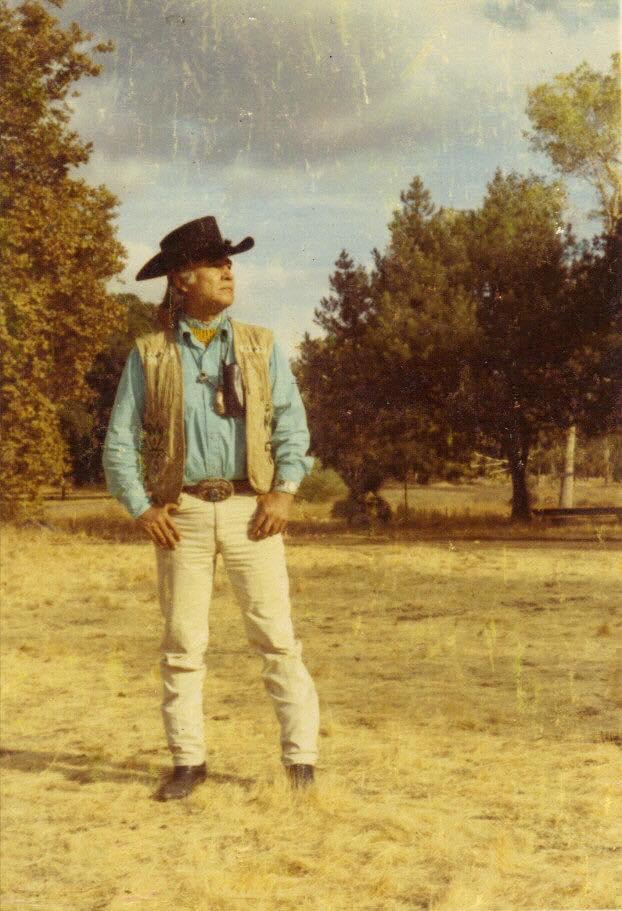Semu One Bear: Respecting Heritage and a Heritage of Respect

Semu One Bear, Regional Vice President of Northern California
“The Chumash used every bit of what Mother Nature gave them. I am so proud of that culture that I have.”
November is Native American Heritage Month, a month dedicated to recognizing the many contributions Native Americans made and continue to make to The United States. This month, we would like to highlight Block by Block (BBB) Regional Vice President of Northern California, Semu One Bear, who spent his formative years growing up on a Native American reservation in Southern California.
A Love that Crossed the Pacific to Chumash Land
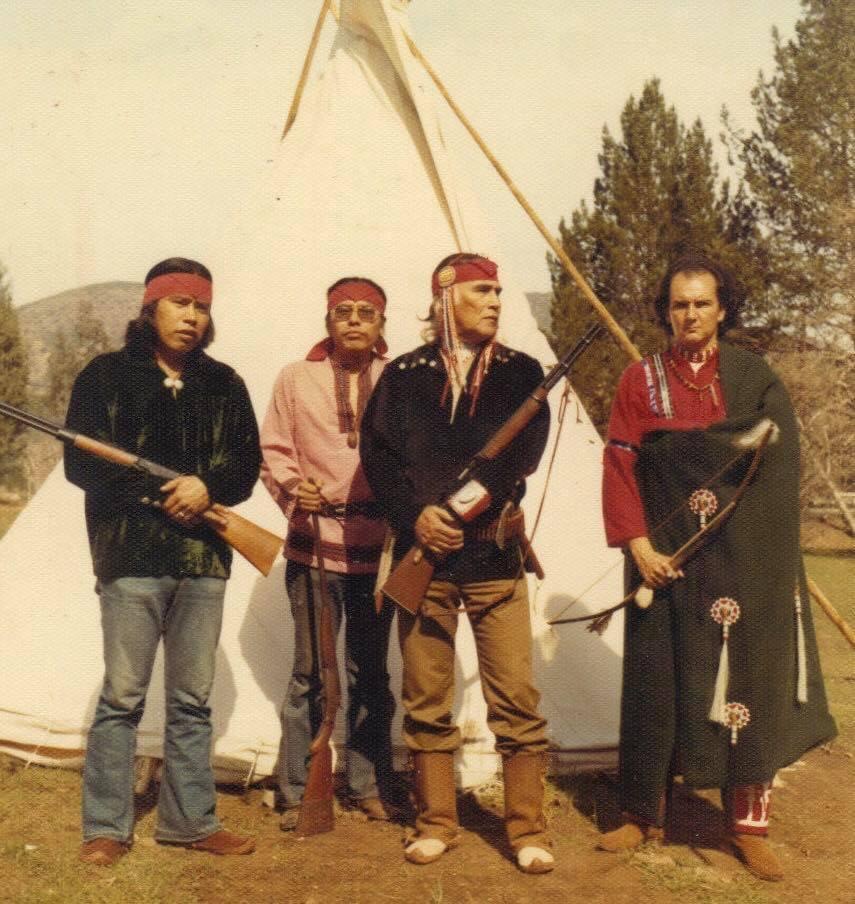
“The teepee we lived in and that’s my dad on the right holding the bow and my grandfather is on his right” – Semu
Semu’s history may seem unique to some, although to him – it’s just the way he was raised. He grew up in a culturally diverse household made up of both Native American and Japanese traditions. Semu’s father was a member of the Chumash Tribe in Southern California, while his mother is Japanese. His father was stationed in Japan while he served in the military, and after serving he later returned to study Japanese. It was then that he met Semu’s mother and the two fell in love.
According to Semu, because of Japanese perceptions of The United States after WWII, his mother’s family did not approve of the relationship at the time. So, the two eloped and moved to The United States, where they would start building their life and family together on land that Semu’s grandfather, a full-blooded Chumash Tribe member, had secured from the United States government.
The Chumash Tribe are some of the original true Californians.
“The Chumash very much used a lot of the gifts that Mother Earth gave them through the ocean. They used natural tar that washes up on shore for their boats and canoes. The land in California provided a lot for the people and they lived off the land very beautifully.”
To this day, you can see locations throughout California named after Native American names, so there is the opportunity to remember the history of the original Californians if one looks close enough.
“This was once a country where we lived off the earth and treated Mother Earth with the respect she deserves. Hopefully, people will eventually realize that and we can go back to that.”
In Chumash culture it is typical to be named after your grandfather, not your father. For this reason, Semu was named after his grandfather, a well-respected Medicine Man in the Chumash Tribe.
Life on the Rez: The Native American Way of Life
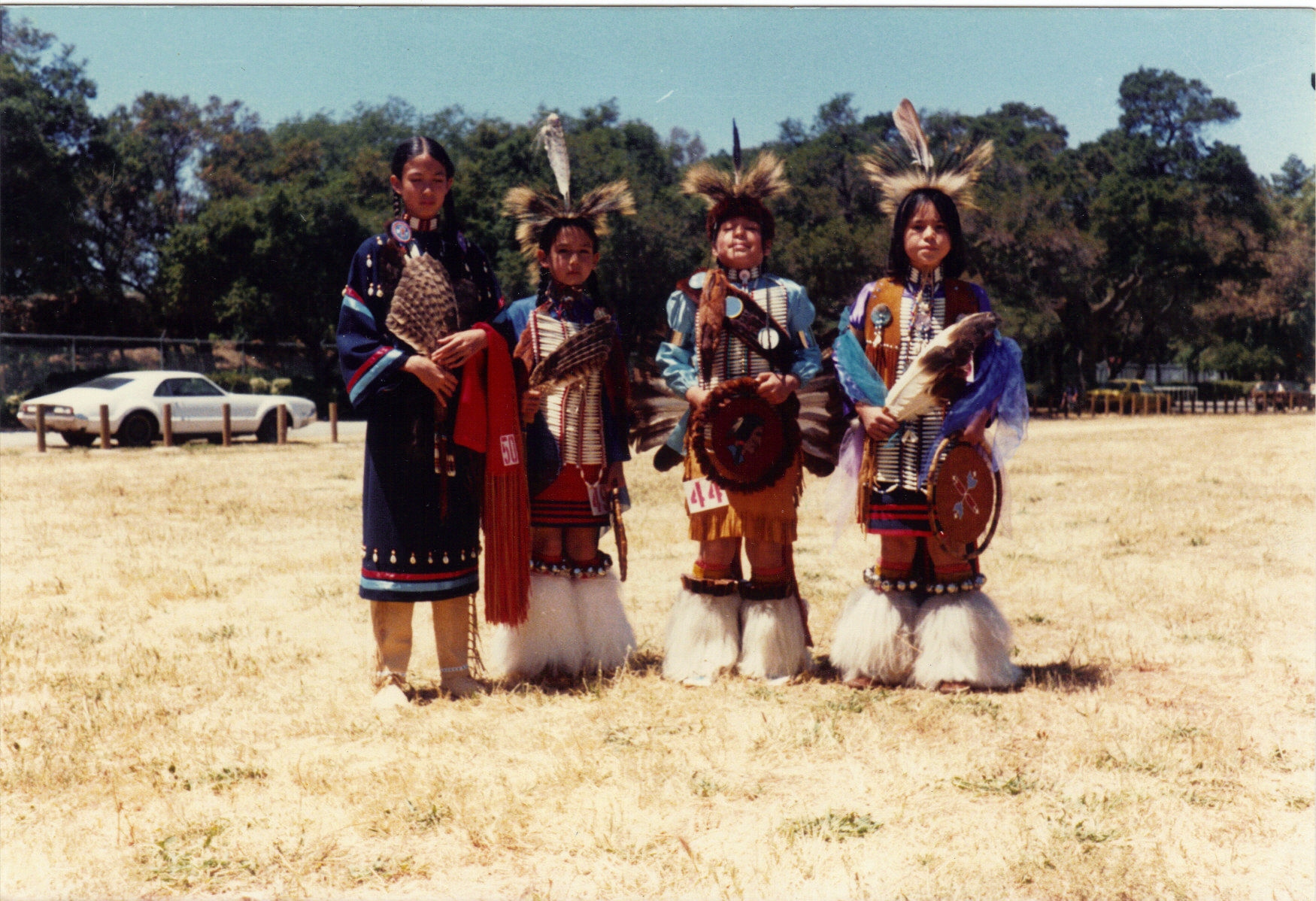
“That’s my sister on the far left and I’m standing next to her” – Semu
While living on “the Rez,” as Semu and his sister called it, Tribe Members stuck together and were very close.
“All of the men in the camp were my uncles, I consider them family. It was a very free, very spiritual upbringing,” Semu said.
One school Semu attended while living on Chumash land was a two-room schoolhouse with just a classroom and a gym where first grade to high school students were taught in the same room. Students would even arrive for school on horseback.
There were times when he and his family would stay in teepees. At one point, while they had a cabin being built, they lived exclusively in the teepee until the cabin was finished.
“I loved it as a child. There was a lot of freedom growing up. I would go with the rest of the kids to the mountains and hills, hunting, fishing, and living outside like the old ways. It was very spiritual.”
“My Grandfather Semu Huaute, a Chumash medicine man and who I’m named after” – Semu
As Medicine Man, Semu’s grandfather provided alternative medicine for those who were dealing with physical or mental ailments that didn’t require a trip to the hospital. He also led spiritual ceremonies and sweat lodges.
“When you go to a sweat, you’re supposed to sweat the bad out of your body and pray to the Great Spirit in the sweat lodge. We’d run out after to go jump in the river because we were so overheated.”
Semu danced, drummed, sang and attended powwows. During powwow birthdays, the family celebrating a birthday would give out presents to the rest of the band or camp, the opposite of traditional birthday parties most of us are familiar with.
Even though Semu and his family eventually left the reservation around the time he was in middle school, they did not stop participating in Chumash traditions.
Home Life Growing Up: Japanese and Chumash Worlds Collide
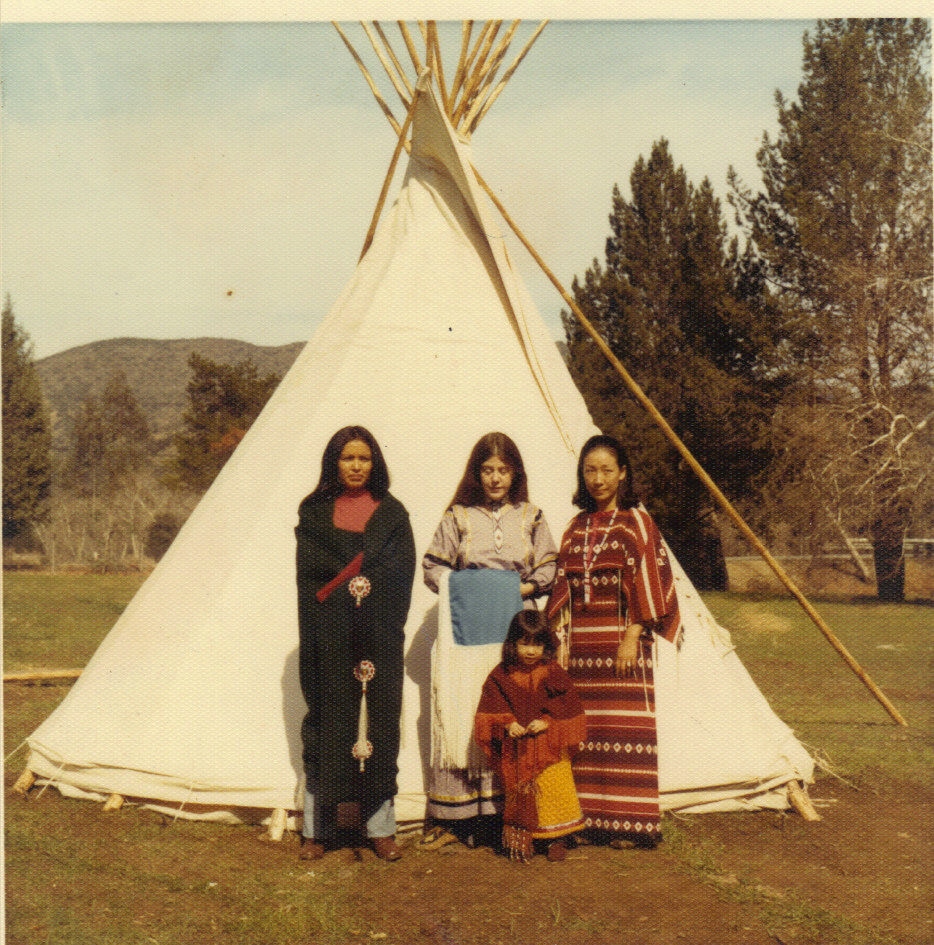
“My mom is on the far right standing next to my older sister” – Semu
Semu’s father was a strict military man who taught Semu and his sister to respect their elders and not to talk back, helping lead them down the right path. He worked for the school district and held Semu and his sister to high standards of studying and participating in their cultural heritages.
After moving off the reservation, the family still participated in powwows, including The Stanford University Powwow that is held every year. Just to participate in Powwow dances, Semu would have to spend three hours, twice a week, practicing dances after school. Semu’s father also made traditional Native American turquoise jewelry to wear and sell at these events.
In addition to teaching his children his Native American heritage, Semu’s father also devoted time to raising Semu and his sister with his wife’s Japanese culture.
Since his father spoke fluent Japanese and his mother was Japanese, they only spoke Japanese in the house. Semu and his sister weren’t allowed to speak English at home.
Semu remembers being “forced” to study Japanese reading and writing and feeling bitter about it at the time. Now, however, he realizes what an advantage it is to know a second language and is grateful for the work he did to learn Japanese and speak it fluently to this day.
Semu’s father also wouldn’t allow them to participate in sports, so instead Semu studied Aikido, a Japanese martial art that empowers one to overcome their ego to prevent violence when possible. At one point, he did sign up for wrestling with the sneaky help of his mother. But, once his dad found out, he had to quit.
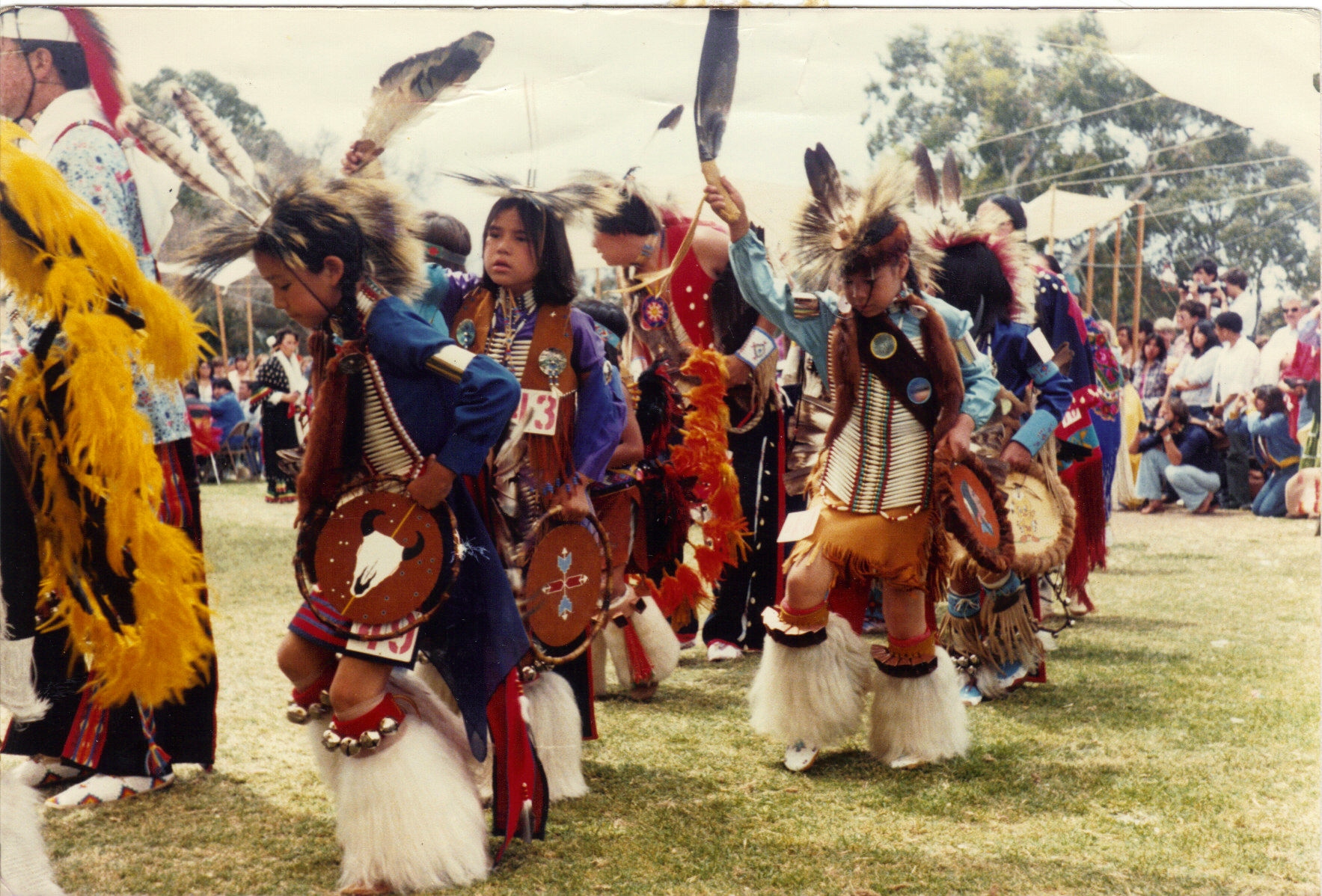
“That’s me with the Buffalo skull shield” -Semu
“He wasn’t trying to be cruel. He just wanted us to be more traditional,” Semu reflected.
The family celebrated traditional Japanese holidays like Hinamatsuri (Girls’ Day) and Tango no Sekku (Boys’ Day) to remind them of the old ways. They also participated in Obon Festival, which honors deceased ancestors, much like the Mexican holiday El Día de Los Muertos.
During middle school, Semu had long hair, something that signifies strength to Native Americans. He said this and growing up with a name like Semu One Bear brought him the wrong kind of attention and he would get teased and end up in fights.
Semu remembers experiencing discrimination in those days.
“It was different back then. It wasn’t cool in the 70s, 80s or 90s to be Native American. You were still considered a lower-class person then… Native Americans had a bag stigma. My dad dressed Native American—with the hat, shirt with a choker. Once, we were at a store near Red Wind and a guy called my dad a [racial slur]. My dad got upset and went over to educate him.”
While he endured bullying and, at times, discrimination, today, Semu has nothing but gratitude for the way his mother and father raised him and the respect that they instilled in him.
“I’m very connected to the Native American way of life…Every weekend, I go to nature to go hiking or camping. The love of nature and the spirituality surrounding it has followed me everywhere.”
Respect: A Way of Life into the Workplace and Beyond
While Semu no longer dances or sings, his sister and niece both dance in the Japanese Obon Festival each year, and he attends to watch them. His sister has also gotten in the habit of attending The Stanford University Powwow again, just as he and his family did when they were younger. He wants to start going back as well to support the local artisans who are doing just as he and his family used to do.
Today, Semu attributes his way of life and outlook on life to the influence of Japanese and Native American traditions during his upbringing.
“I’m very liberal in a lot of ways, I think, as far as preserving the earth. I call it Mother Earth; it is my Mother Earth. I care for the environment. I spend a lot of time outdoors. I’m conscious of recycling, making sure not to litter.”
He also believes that respect and the diverse cultural influences empowered him to be the strong leader he is today at BBB.
“I learned respect the most. In our cultures, it is all about respect. So much is based on respect. I learned respect and I carry it over to everybody. I treat a first day Cleaning Ambassador with the same respect I treat Derreck [Hughes, BBB Vice President of Operations].”
Semu also made a special point to mention that his respect extends heavily to the LGBTQIA+ Community, a community with a strong presence in the region he oversees. He intentionally works to create a welcoming and inclusive environment for everyone working in his region.
“That one word—Respect…I use that same respect any time I deal with anyone in the workplace…I was one of the first to ask for personal pronouns and the people I asked were so happy that I asked…My childhood taught me to never judge somebody by their culture and it is important in my role to keep learning about [gender identification and pronouns] because it is all about respect.”
His connectedness to nature also influences his placemaking work, something BBB implements in many of our programs throughout California.
“I always think of the consequences of projects. The first thing I look at when I look at designer plans is the natural aspect. What are we going to do to make sure we keep the native plants and native wildlife here? How do we make something nice for everybody to enjoy, but keep in mind the river has been here long before us and will be here long after we are gone?”
Semu has worked for BBB since 2009. He began, as many of our upper management do, as an Ambassador before working his way up to Operations Manager with San Jose, Groundwerx. His drive and determined work ethic led him to being promoted to Project Manager, then Regional Director and, ultimately, Regional Vice President (RVP), his current role. As RVP, Semu oversees operations for 20 programs throughout Northern California, ensuring they all run smoothly and efficiently to BBB standards.
We are honored to have Semu in our ranks and grateful to be able to share his story. We join the country in celebrating Semu and Native American Heritage Month.
If you are interested in learning more about Chumash culture and the Tribe today, you can visit their website. There is also a lot of history that exists surrounding Semu’s grandfather Semu Huaute, as he traveled the country and world extensively sharing Chumash history and traditions. This can be found by googling his name.
